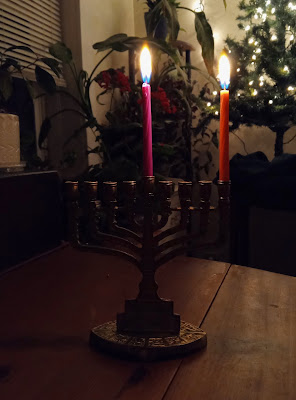As a Jewish believer in Jesus, one of the most meaningful things I do each year is observe Advent. It is a practice in remembrance and reflection, drawing from the most ancient stories that point towards a future Hope. One such story is celebrated during the Jewish holiday of Hanukkah. It is a wonderful celebration of a miraculous time in Jewish history. Like so much of Israel’s past (both included and excluded from canonized Scripture), the story of the Maccabees is a foretaste of the Messiah’s victory—a victory over sin and death.
Hanukkah celebrates the Maccabees successful guerilla warfare against their Selucid-Greek oppressors and an oil miracle that allowed the Jewish people to rededicate the Lord’s Temple with a fully functioning menorah.
When Jesus walked on earth, he traveled to Jerusalem to celebrate Hanukkah—the Feast of Dedication. The events are recorded in John 10 and only two chapters earlier, Jesus declares Himself the Light of the World. With all this talk of light and re-dedication (in Jewish tradition eight is a number symbolizing newness), those around Jesus asked him,
“How long will You keep us in suspense? If You are the Christ, tell us plainly.” John 10:24b
Thinking back to the miracles enabling them to celebrate the Feast of Dedication, the people pictured an Anointed Savior like Judah Maccabees, someone who could be victorious against the Romans like the Maccabees were against the Seleucid.
But Jesus did not come for that kind of fighting. He came armed with Truth and Light, delivering the ultimate of miracles: newness of life, not just for the Jews, but for all.
In modern times we have the benefit of looking back in commemoration with rose-tinted glasses. We see the glory and triumph, the need for celebration. But in the middle of the first Hanukkah and first Christmas—life was hard. Harder than hard.
A few years ago I quoted from a Desiring God article entitled, "Christmas Doesn’t Ignore Your Pain." In it, David Mathis writes,
“. . . Christmas does not ignore our pain. When we open the pages of Scripture and turn to that first Christmas, we find, without doubt, that all was not merry and bright. The new glimpses of merriness that do emerge fall against the backdrop of misery and disorder. Those first rays of brightness shone in a land of deep darkness. . .The story of Hanukkah took place in the middle of what we now call the 400 years of silence. The Jewish people were living oppressed, and they didn’t know if God was even there anymore. There were no prophets to give them a word from the Lord. But God heard the prayers of His people and He never stopped laying the groundwork for an ultimate Deliverer. In the fullness of time, God sent His son to be born in lowly, dirty circumstances. To show us a way out of the darkness. And to make all things new.
More significant than Joseph’s or Mary’s pain is the pain and sin and suffering and ruin for which Jesus came. The angel declared to Joseph, “You shall call his name Jesus, for he will save his people from their sins.”
. . . If God’s people, not to mention the nations, weren’t needy — desperately so — there would have been no Christmas. Christ did not come to put on a show or make a cameo in history. He came to bring life to the dead, to rescue the perishing, to heal the sick, to destroy the works of the devil. For centuries, misery and darkness had been compounding. Only in coming to such a depraved and disfigured world would his arrival signal hope for any real merriment and brightness."
Baruch atah, Adonai Eloheinu, Melech haolam, shehecheyanu v'kiy'manu v'higiyanu laz'man hazeh.
Blessed are You, oh Lord our God, King of the Universe, who has given us life, sustained us, and brought us to this season.


No comments:
Post a Comment
Note: Only a member of this blog may post a comment.